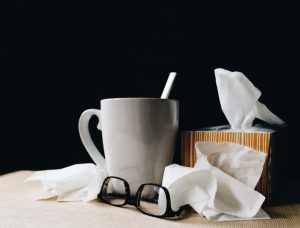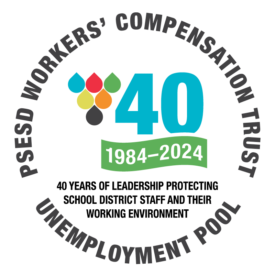 The best way to reduce the risk of exposure to the flu virus in the workplace is to use basic hygiene precautions and follow these recommendations:
The best way to reduce the risk of exposure to the flu virus in the workplace is to use basic hygiene precautions and follow these recommendations:
- Get vaccinated! Vaccination is the most important way to prevent the spread of the flu. If your district offers flu shots, be sure to take advantage.
- Stay at home if you are sick. The CDC recommends that employees who have a fever and respiratory symptoms stay at home until 24 hours after their fever ends (100 degrees Fahrenheit or lower), without the use of medication. Not everyone who has the flu will have a fever. Other symptoms could include a runny nose, body aches, headache, or tiredness.
- Wash your hands frequently with soap and warm water for 20 seconds, rubbing carefully all areas, then rinse and dry.
- Use an alcohol-based hand rub ONLY if soap and water are not available (good hand washing is more effective). When using an alcohol-based hand rub, apply liquid to palm of hand, cover all surfaces of the hands with the liquid, and rub hands together until dry.
- Avoid touching your nose, mouth, and eyes.
- Cover your coughs and sneeze into your upper sleeve(s) or tissue.
- Wash your hands after coughing, sneezing, or blowing your nose.
- Keep frequently touched common surfaces (e.g., telephones, computer equipment, etc.) clean by wiping them off with non-scented baby wipes
- Try not to use a coworker’s phone, desk, office, computer, or other work tools or equipment. If you must use a coworker’s equipment, wipe it down first
- Avoid close contact with people who are sick. When you are sick, keep your distance from others to protect them from getting sick too. Skip shaking hands or using a coworker’s tools or equipment.
- Stay in shape. Eat a healthy diet and drink lots of water. Get plenty of rest, exercise, and try relaxation techniques.
- Pay extra attention if you are in a high-risk category for seasonal flu (elderly, pregnant women, small children, persons with asthma, etc.).
- Use general cleaning products that you normally use. Always follow product label directions. Additional disinfection beyond routine cleaning is not usually recommended. Flu viruses are relatively fragile, so standard practices, such as cleaning with soap and water, can help remove and kill them.
- Food safety. Ensure that the commonly used dishes are properly cleaned with the high-temperature cycle of the dishwasher. Try to stay away from community food if you don’t feel well – ask a coworker to cut you a piece and take it to you.
Further guidance for school administrators and child care providers can be found at the CDC website: https://www.cdc.gov/flu/school/index.htm



